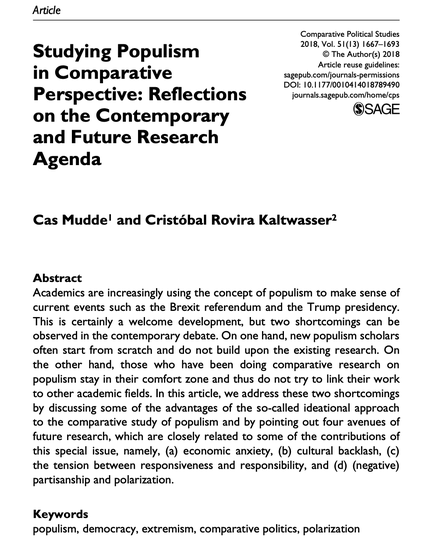
Article
Studying Populism in Comparative Perspective: Reflections on the Contemporary and Future Research Agenda
Comparative Political Studies
(2018)
Abstract
Academics are increasingly using the concept of populism to make sense of current events such as the Brexit referendum and the Trump presidency. This is certainly a welcome development, but two shortcomings can be observed in the contemporary debate. On one hand, new populism scholars often start from scratch and do not build upon the existing research. On the other hand, those who have been doing comparative research on populism stay in their comfort zone and thus do not try to link their work to other academic fields. In this article, we address these two shortcomings by discussing some of the advantages of the so-called ideational approach to the comparative study of populism and by pointing out four avenues of future research, which are closely related to some of the contributions of this special issue, namely, (a) economic anxiety, (b) cultural backlash, (c) the tension between responsiveness and responsibility, and (d) (negative) partisanship and polarization.
Keywords
- populism,
- democracy,
- far right,
- extremism,
- polarization
Disciplines
Publication Date
November, 2018
DOI
https://doi.org/10.1177/0010414018789490
Citation Information
Mudde C, Rovira Kaltwasser C. Studying Populism in Comparative Perspective: Reflections on the Contemporary and Future Research Agenda. Comparative Political Studies. 2018;51(13):1667-1693. doi:10.1177/0010414018789490
Creative Commons license

This work is licensed under a Creative Commons CC_BY International License.
